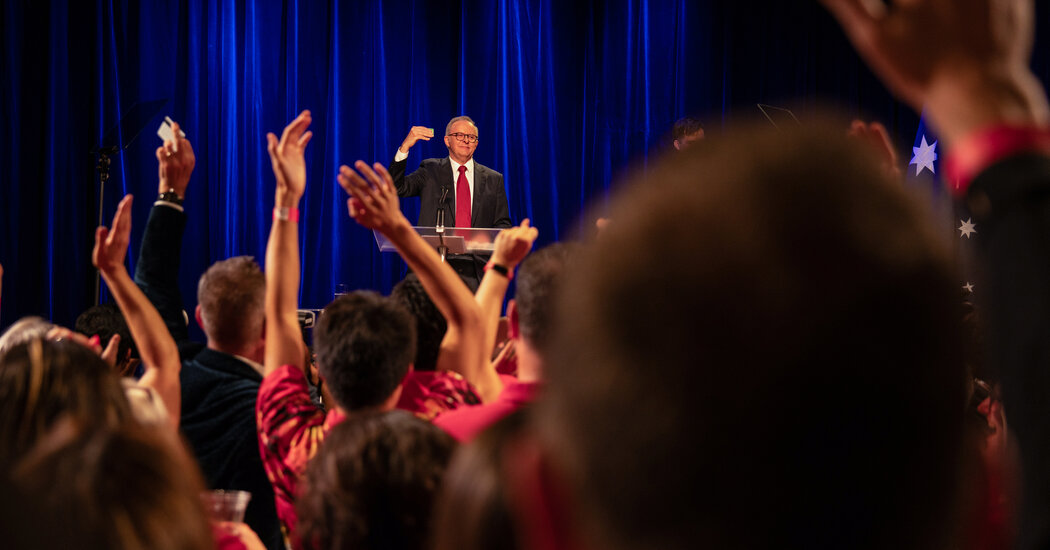Albanese cruised to re-election in Australia
Prime Minister Anthony Albanese pulled off a stunning landslide victory on Saturday to clinch a second term as Australia’s leader. The global turmoil caused by President Trump’s policies made the U.S. leader a factor throughout the election, and anti-Trump sentiment appears to have helped deliver the center-left Albanese the win.
Peter Dutton, the leader of the conservative opposition, also lost his parliamentary seat in his home state of Queensland. On the eve of the election, we spoke with Victoria Kim, our Australia correspondent, to learn more.
Pollsters for a long time thought the opposition was all but certain to win. What changed?
Victoria: Earlier in the year, Dutton leaned into some of Trump’s rhetoric and policies in talking about government efficiency, saying he would eliminate public service positions and expressing distaste for diversity initiatives. As the world got a clearer view of what the second Trump presidency really looked like, that association seemed to backfire.
Even though Australia hasn’t seen nearly the level of impact from the tumult in Washington as Canada has, it still cast a pall over electing someone even remotely in Trump’s likeness. The conservative opposition also hasn’t made an effective case that average Australians would fare better in matters like cost of living or housing under its stewardship.
Is the vote for Albanese based on a desire for stability?
Analysts say it’s more that the economic uncertainties and international convulsions emanating from Washington make the option of Albanese — who is practical and understated, if unlikely to attempt bold moves to address larger challenges facing the country — more palatable.
Israel’s siege of Gaza is ‘catastrophic,’ doctors said
It has been more than 60 days since Israel halted all humanitarian aid entering Gaza — no food, water, fuel or medicine. Preventable diseases and illnesses are surging — and so is the likelihood of dying from them, doctors say.
Some patients in Gaza — people with treatable heart problems or kidney failure — have called the enclave’s health minister themselves to ask: If there is no medicine, what else can they try?
“There’s no advice I can give them,” the minister said. “In most cases, those patients die.”
Reaction: As humanitarian groups and European officials condemn the blockade, Israel has argued that it is lawful, and that Gazans have enough available provisions.
Changing tactics: Israel said it would mobilize thousands of reserve soldiers to bolster its Gaza campaign.
Six deadly minutes: We broke down how Israeli soldiers killed 15 rescue workers in Gaza in March.
More U.S. air defense is being sent to Ukraine
A Patriot air-defense system that was based in Israel will be sent to Ukraine after it is refurbished, current and former U.S. officials said. Western allies are also discussing the logistics of asking Germany or Greece to provide Kyiv with another one. While Ukraine is still receiving weapons authorized under the Biden administration, those supplies are expected to end this summer.
Tim Friede has injected himself with more than 650 doses of snake venom to build his immunity to 16 deadly species. He has also allowed snakes to bite him about 200 times.
Scientists now think Friede’s blood could be used to develop a universal antivenom, one that could help solve a dire global health problem.
Lives lived: Sister Inah Canabarro Lucas, a Brazilian nun who was believed to be the oldest person in the world, died at 116.
CONVERSATION STARTERS
The past and the future of Black music in ‘Sinners’
In a scene from Ryan Coogler’s “Sinners,” an ambitious tracking shot inside a 1930s juke joint spiritually unites a bluesman with other, more contemporary musicians, including a D.J. at a turntable.
“Aakomon Jones, our choreographer, is changing choreography ever so slightly so that folks still feel like they’re in their time, but also outside of it as we get more and more heightened in this moment,” Coogler said. Watch as the director narrates the scene here.
RECOMMENDATIONS
That’s it for today. See you tomorrow. — Emmett
P.S. Lyndsey Layton is our new climate editor.
A correction: Friday’s newsletter misstated the timing of Sean Combs’s trial. It starts this month, not next month.
We welcome your feedback. Send us your suggestions at briefing@nytimes.com.



